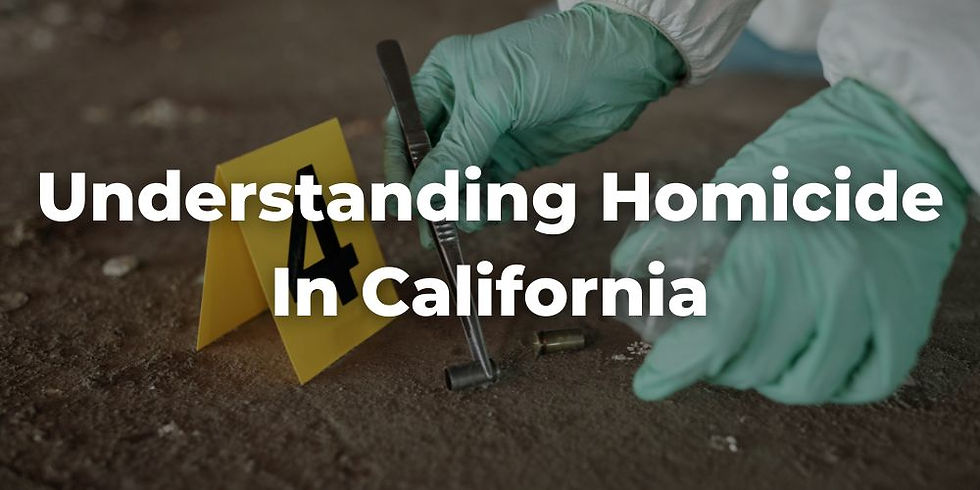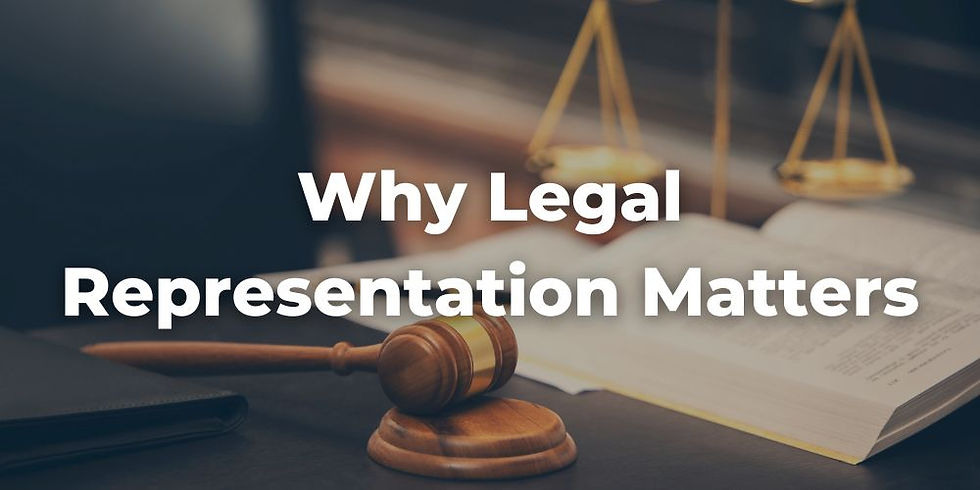Defenses to Homicide in CA
- Blair Goss

- Jul 30, 2025
- 7 min read
One of the most serious criminal charges a person can face is homicide. Murder charges are often met with life imprisonment or even the death penalty in a felony murder case. However, a charge is a charge...it is not a conviction.
With the right defense, a person who is facing homicide charges may be able to totally avoid a conviction, or if they are found guilty, it's possible that charges can be reduced. It is also import to know the answer to the question of What Is homicide?
Understanding these charges is extremely important for anyone facing them. This is why Goss Law wants to ensure that readers understand the most common and effective legal defenses to homicide in California. They can answer questions like What are the different types of homicide charges in CA?

Understanding Homicide Under California Law
Before examining the defenses possible when facing homicide charges, it's important to understand how the State of California defines homicide. By looking at the California Penal Code, it's possible to see that the state defines homicide as the unlawful act of killing another person. The crime is split into several different offenses:
Capital Murder - Murdering someone for financial gain, because of race or color, murdering multiple victims, etc, is a type of first degree murder known as "capital murder."
First Degree Murder - The act of willfully, deliberately, and premeditatedly killing a human being.
Second Degree Murder - Second degree murder charges come from the act of intentionally killing someone, but the crime is not a premeditated killing.
DUI Murder - DUI murder charges occur when the accused kills someone with a vehicle and that person has prior DUI convictions.
Voluntary Manslaughter - A "heat of passion" killing, or a killing that results when someone "snaps," but it is not an intended homicide. For instance, they may have meant to cause serious injury, but not death.
Involuntary Manslaughter - Unintentionally taking a human life resulting from criminal negligence or during the commission of a non-felony crime.
Each of these charges have different penalties and legal elements, and there are things that may elevate these charges. From attempted murder and vehicular manslaughter to second degree felony murder and first degree felony murder, the defense that is created is always specific to the case.
However, there are general defenses to choose from, and any good attorney will consider everything about the case before settling on one of the following:
Common Defenses to Homicide in CA
Defending against homicide charges isn't easy, but it's certainly possible. Several strategies will come into play in most cases. Here are some of the most commonly used defenses to homicide in CA:
1. Self-Defense or Defense of Others
On of the most common defenses in a homicide case is self-defense. California Penal Code § 198 states that a person is legally justified in using deadly force if they believe that they, or someone else, was in imminent danger of being killed or gravely injured.
An attorney can prove that the defendant acted in self defense if they can show the following:
The defendant is a reasonable person who believed that they were in immediate danger
The accused intended to protect themselves
The use of force was proportional to the threat against them - the defendant used only the force necessary to meet the assailant
It's also possible to use self-defense in cases where a person kills another in order to defend a family member, a friend, or even a stranger who is in danger. In this case, the action is a lawful act.
2. Accident or Misfortune
California Penal Code § 195 states that not all deaths are due to unlawful killing. Instead, someone's actions can result in an accidental death. In this case, the defense attorney has to show that the death occurred without negligence or intent from the accused.
3. Insanity Defense
California’s M'Naghten Rule states that a defendant can be found not guilty by reason of insanity if, when the killing occurred, they did not understand the nature of their act or they did not understand that the act was legally or morally wrong.
An attorney who uses this defense will submit substantial psychiatric or psychological evidence that is usually supported by mental health evaluations. If this defense is successful, instead of prison, the accused is usually committed to a mental health institution for treatment.
4. Lack of Intent (Challenging Mens Rea)
Intent to kill plays a very important role in deciding which type of homicide charges are handed to the defendant. For example, felony murder charges, like first degree murder, requires the deliberate planning or intention of killing another person. Manslaughter, however, does not. Thus, first degree murder carries more serious penalties compared to manslaughter.
With this defense, an attorney can argue that the defendant did not intend to kill the other person, which could lead to reduced charges or full dismissal of the case.
It's important to remember that for charges to stick, the prosecution must prove, beyond a reasonable doubt, that the accused person intended to kill. If they can't prove that, the defense can ask for reduced charges or initiate a plea deal for lesser charges.
5. Alibi
A good alibi is the key to a full and complete defense. If the accused person can prove that they were someone else at the time of the death, they can't possibly be guilty.
To support an alibi defense, a criminal defense attorney might show evidence like surveillance footage, witness testimony, or digital records like credit card statements or phone GPS location records.
6. Mistaken Identity
Sometimes, a murder conviction is avoided by the defense proving mistaken identity. In some cases, an eyewitness may misidentify the accused person, or the defendant might look like the real perpetrator. This may happen in a chaotic scene, or if the witness sees the crime from far away or during a time when there isn't a lot of light. For instance, if a police officer sees what they believe to be a homicide occur, but they are block away and it's dark, it's very possible that they could identify the wrong person.
Some of the evidence that can support this defense include DNA, fingerprint evidence, eyewitness inconsistencies, and video footage.
7. False Confession or Coerced Statements
Even if the accused person confessed to the crime, it's possible that a defense attorney can argue that it was an involuntary confession. This is especially true if the accused person believes that they were coerced to confess or deceived by law enforcement officers.
Under California Evidence Code § 405, a coerced confession cannot be admitted into evidence. The defense may present testimony that psychologists or law enforcement violated this in order to force a confession.
8. Imperfect Self-Defense
California law also allows for a defense known as an "imperfect self-defense." If the defendant believed that they were in danger and that they needed to use force, but that belief was found to be unreasonable, the charge can be reduced from murder to manslaughter. With this defense, the defendant acknowledges that the emotional state they were in made them believe that they were in danger, but they are also still accountable. A defense like this often shields the accused from the most severe penalties.
9. Duress
Though it's very rare to apply to homicide, duress might be considered in extremely specific circumstances. If the defendant was forced to kill another, they may have a defense. It's important to keep in mind, however, that under California law, duress is not a valid defense. It can, however, be used to negotiate a plea deal.
10. Violation of Constitutional Rights
It's also possible a that a lawyer can claim that the Constitutional rights of the defendant have been violated. For instance, if the accused was not read their Miranda rights, if their Fourth Amendment (unlawful search and seizure) was violated, or if inadmissible evidence was used to charge the them, this defense can work.
The Importance of a Customized Defense Strategy
The truth is that no two homicide cases are the same. Every case has its own facts, background, and evidence. A criminal defense attorney will do the following:
Investigate all parts of the case
Analyze police reports and forensic evidence
Talk to expert witnesses
Determine the most effective defense for the specific case.
Homicide Penalties in California
The penalties for homicide are very steep, and it's possible that even someone who didn't commit the crime of homicide could be convicted. For instance, California has a felony murder rule that states if, for instance, a criminal street gang attacks another person. One person kills the victim. However, based on the felony murder rule, since the act of attack would be a felony crime, everyone involved could face first degree murder charges.
It's also possible that the prosecution can elevate charges due to specific factors in the case, such as if a deadly weapon was used in a hate crime.
To fully understand the gravity of a homicide charge, consider the possible consequences:
First degree murder - 25 years to life in prison
Capital murder - Life in prison without parole or the death penalty
Second degree murder - 15 years to life
Voluntary manslaughter - 3 to 11 years in state prison
Involuntary manslaughter - 2 to 4 years in state prison
With so much at stake, raising a strong defense is not just an option—it is a necessity.

Why Legal Representation Matters
California homicide cases are aggressively prosecuted, and even if the defendant intended to commit the crime or not, they still need a strong defense.
Though this does not constitute legal advice, it does help to understand how serious these charges are, and how a prosecution's case can make it difficult to create a defense without a strong and aggressive attorney.
Goss Law takes homicide cases very seriously, and understand that the defendant needs the best possible defense. For those facing homicide cases, or their family, Goss Law offers a free consultation. Call today.

Comments